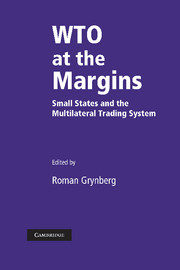Book contents
- Frontmatter
- Contents
- List of figures and appendices
- List of tables
- List of contributors
- Introduction
- Part I Theory and evidence
- Part II WTO and small economies
- 8 Small vulnerable economy issues and the WTO
- 9 Special and differential treatment for small developing economies
- 10 A study of alternative special and differential arrangements for small economies
- Part III WTO dispute settlement
- Part IV Negotiating issues and institutional arrangements
- Index
9 - Special and differential treatment for small developing economies
Published online by Cambridge University Press: 05 May 2010
- Frontmatter
- Contents
- List of figures and appendices
- List of tables
- List of contributors
- Introduction
- Part I Theory and evidence
- Part II WTO and small economies
- 8 Small vulnerable economy issues and the WTO
- 9 Special and differential treatment for small developing economies
- 10 A study of alternative special and differential arrangements for small economies
- Part III WTO dispute settlement
- Part IV Negotiating issues and institutional arrangements
- Index
Summary
Introduction
The international community has recognised that there are significant differences between countries at different levels of development. It is for this reason that it formally acknowledges developed countries, developing countries and least developed countries (LDCs). It was recognised that in a multilateral trading system with a standard set of rules the developing countries and LDCs would be at a disadvantage relative to the developed countries. It was also deemed desirable that the economic growth/development and structural adjustment of developing countries and LDCs should be promoted by special and differential treatment (SDT). In a multilateral trading system with such wide differences among countries, special and differential treatment is a necessity and is therefore one of the fundamental principles of the World Trade Organization agreements. It has the same validity as the most favoured nation principle and is not a derogation to be applied to some countries on a temporary basis.
Up to the present time the international community has proceeded on the basis of different levels of development. However, in addition to differences in levels of development there are substantial differences in size among economies. Small developing economies (SDEs) are a sub-set of developing countries. The SDEs are a specific type of developing country whose stability, adjustment and growth are constrained by both level of development and small size. Small size is an additional constraint, which distinguishes small developing economies from the genre of developing economies as a whole.
- Type
- Chapter
- Information
- WTO at the MarginsSmall States and the Multilateral Trading System, pp. 309 - 355Publisher: Cambridge University PressPrint publication year: 2006
- 3
- Cited by



